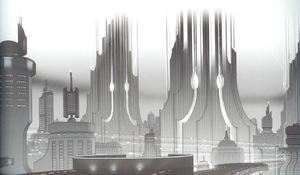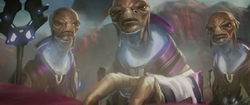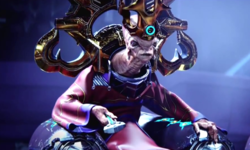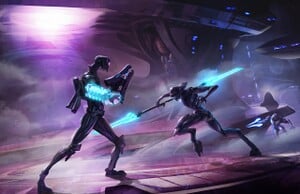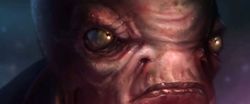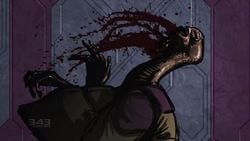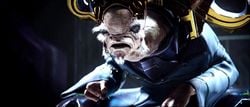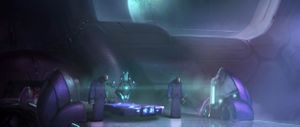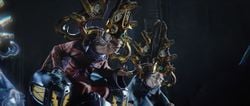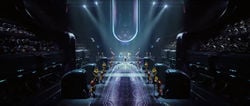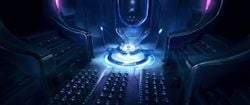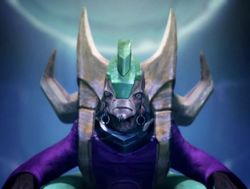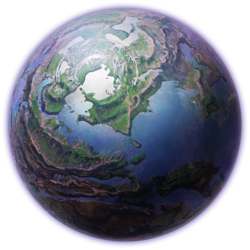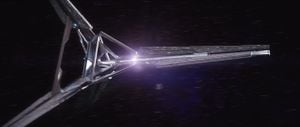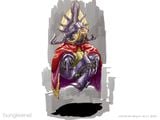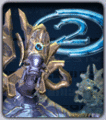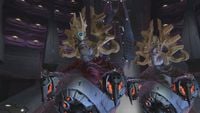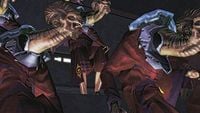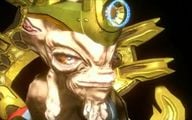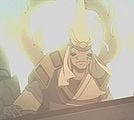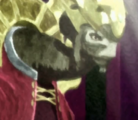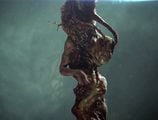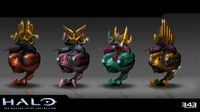San'Shyuum: Difference between revisions
From Halopedia, the Halo wiki
m (→List of appearances: H5 Limited Edition -> Dossiers) |
m (added new appearance) |
||
| Line 282: | Line 282: | ||
*''[[Halo: Divine Wind]]'' | *''[[Halo: Divine Wind]]'' | ||
*''[[Halo Infinite]]'' {{C|Hologram only}} | *''[[Halo Infinite]]'' {{C|Hologram only}} | ||
*''[[Halo: The Television Series]] | |||
{{col-end}} | {{col-end}} | ||
Revision as of 20:25, March 14, 2022
| San'Shyuum | |
|---|---|
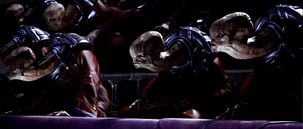
| |
| Biological overview | |
|
Latin name: |
Perfidia vermis[1] |
|
Diet: |
Omnivorous |
| Physical information | |
|
Avg. height: |
213.4 cm (7')–226.1 cm (7'5") (In Gravity Thrones)[2][1] |
|
Avg. weight: |
81.4 kg (179.4 lbs)–96.6 kg (212.9 lbs)[1] |
|
Distinctions: |
Long necks, humanoid features[1] |
|
Avg. lifespan: |
Over two hundred years[3] |
| Sociocultural information | |
|
Homeworld: |
|
|
Notable individuals: |
|
|
Also known as: |
|
|
Languages: |
|
San'Shyuum (Latin Perfidia vermis,[3] meaning "worms of treachery"),[14] also known as Prophets by many individuals, are a near-extinct sapient species native to Janjur Qom. Prior to the Great Schism in 2552, the San'Shyuum served as the leadership caste of the Covenant. By that time, the San'Shyuum had exerted complete control over the Covenant's religious and political affairs.[3]
Contemporary San'Shyuum civilization developed on a planet rich in artifacts left behind by the Forerunners, whom the Covenant would later revere as gods.[11] Prophets derived their legitimacy as leaders as well as their colloquial names from this connection. The San'Shyuum of the Covenant originated from the Reformists, a radical faction that believed Forerunner technology should be deeply analyzed and fled Janjur Qom aboard the Forerunner Dreadnought after a lengthy civil war.[15] According to the San'Shyuum, their homeworld was later allegedly destroyed in 648 BCE as the result of a natural stellar collapse. Because of this, they elected to make their home on the mobile planetoid station High Charity, powered by the Dreadnought.[3]
The San'Shyuum waged a fierce and bloody war against the Sangheili between 938 and 852 BCE,[15] halted only by their realization that the war would never come to an end.[11] The two races united to learn their secrets, forming a mutually beneficial arrangement that would eventually become the Covenant, although they typically regarded themselves as above the Sangheili. The Sangheili became the protectors of the Prophets while the Prophets dedicated themselves to studying their "gods" and learning the secrets behind the "ascension" they left on.[16]
Since the activation of the Halo Array and the subsequent reseeding, the San'Shyuum population has diminished. While their population at the time of the reintroduction was 500,000,000,[3] there were only 23,831,463 living San'Shyuum by 2552. After the Flood invasion of High Charity, the majority of their species was consumed and it was estimated that less than a thousand members of the species still lived, assuming that the destruction of Janjur Qom did in fact occur.[3] However, a flotilla of starships capable of supporting thousands managed to evacuate surviving San'Shyuum from High Charity,[5] with a secret destination set for the Shield World of Cloister to hide from the vengeful Sangheili.[17] The current status of this flotilla's voyage and whereabouts, are unknown to most in the known galaxy.[18]
History
Prehistory
- "The San'Shyuum are not naturally inclined to war. They are a handsome, intelligent race, besotted with eternal sexuality and youth. They hoped to spend their lives in luxury. For all that, their science was extraordinary."
- — The Didact, referring to the prehistoric San'Shyuum[19]
Early on in their first space-faring civilization, the San'Shyuum mined material in the Oort cloud surrounding their home system for starship fuel.[20] Later, the San'Shyuum achieved remarkable technological sophistication, and after encountering the prehistoric human civilization, the San'Shyuum and the humans formed an alliance, based on the planet Charum Hakkor, forming a major power in the Orion Arm of the galaxy.[19] The San'Shyuum were commonly regarded as a peaceful species.[21] During this period, they encountered the Flood for the first time, but the spread of the infection was successfully pushed back by their human allies while it was still relatively minor. The empire later collapsed when the San'Shyuum surrendered to the Forerunners during the human-Forerunner wars.[19]
The Forerunners established a quarantine shield that encompassed Janjur Qom and two other inner planets in the system. Under the watch of the Confirmer and the fortress-class vessel Deep Reverence, the San'Shyuum inhabited Janjur Qom, one other planet, and the moons of both worlds.[22] The San'Shyuum managed to regain a comfortable lifestyle, with light commerce and travel between the quarantined worlds under their "control". Abandoning their hedonistic lifestyles for guidance under religious elders,[23] the San'Shyuum were overtly "model citizens" to the Forerunners.[22] However, as the Confirmer grew lax in his duties, the San'Shyuum began stockpiling outdated Forerunner weaponry on the third quarantined planet.[23][24] During the Forerunner-Flood war, the Librarian visited Janjur Qom to secure specimens of San'Shyuum for preservation from the Halo Array. The San'Shyuum elders correctly suspected that a catastrophe was imminent, and launched a short-lived uprising against their Forerunner overseers. All San'Shyuum on the planet were subsequently killed when a Halo was fired on a low power setting nearby.[25] The surface of Janjur Qom remained scarred from the battle for millennia to come and while the events themselves were forgotten, San'Shyuum myth held that their kind had once been punished for rebellion against their gods in the ancient past.[26]
The San'Shyuum were successfully preserved on Installation 00 and were thus sheltered from the firing of the Halo Array in 97,445 BCE. The species was given time to grow and be observed on the Ark wherein Janjur Qom's temperate ecosystem was imitated for them.[27] Interestingly, some San'Shyuum were also permitted to live among humans on the Ark during their time of reacclimation preceding reintroduction as the first species to undergo such a process.[28] Some curious San'Shyuum would also occasionally find their way near the Forerunners who inhabited the Ark and overhear their conversations; the Forerunners believed no harm would come of allowing this, assuming the San'Shyuum would forget what they had heard shortly after their reintroduction.[27] After around a century after the firing of the Halo Array, five hundred million San'Shyuum were reintroduced to their homeworld;[3] due to simple logistics, they were the last species to be reseeded by the Forerunners.[29]
Having eventually lost nearly all memory of the Forerunners, the San'Shyuum discovered Forerunner technology on their homeworld and based their religion around the artifacts they found.[30] Meanwhile, a fragment of Mendicant Bias took control of the keyship, named Anodyne Spirit, that reseeded Janjur Qom and attempted to take it to Earth, but the starship ultimately crashed on the San'Shyuum homeworld.[4]
War of Wills
- "So many worlds contain their leavings and their structures, but only ours was blessed with a ship, a teacher. It taught us all how to unlock the secrets of space and time, to build ships of our own that sail the stars to spread the word. But it also seemed to ever nudge us in a direction, to build weapons of war—energy that could burn or sear flesh, vaporize bone."
- — The Minister of Discovery in his final confessions, prior to his death[31]
Following the activation of the Halo Array, the San'Shyuum recovered faster than most species, with their technological advancements enhanced by the presence of numerous Forerunner relics on their planet.[32] The San'Shyuum redeveloped technology, language, and culture and philosophy based on their observation of these Forerunner artifacts, having little to no knowledge of their species' previous conflicts with the Forerunners.[1] In 2200 BCE, a radical group of San'Shyuum believed that they should enter into the Forerunner Dreadnought present on their planet and learn from its technology. The majority of the San'Shyuum considered the claim to be heresy, leading to the radical San'Shyuum rebelling. As the War of Wills begun, two factions emerged: the conservative Stoics, who refused to enter and desecrate the Dreadnought, and the militant progressive Reformists, radicals who wanted to develop new technologies by entering and studying the Dreadnought.[32][33][34]
Towards the climax of the war, approximately one thousand of the most radical Reformists broke into the Dreadnought and occupied it.[1] While they learned how to activate and commandeer the vessel, the Reformists occasionally raided Stoic territory to collect and stock the ship with natural resources and supplies.[35] In 2100 BCE, the Reformists finally learned how to activate the Dreadnought. The outraged Stoics were unable to take action, since even their fury toward the Reformists could not bring them to destroy the object of their reverence. The Reformists then took flight from Janjur Qom, breaking off a massive chunk of rock in doing so. This piece of rock would later become the foundation of High Charity, the future holy city of the Covenant.[32][34] With the help of the Forerunner technology from the Dreadnought, the Reformists were able to survive and travel the galaxy.[32]
Although the Reformists had achieved victory and left the Stoics behind, they realized that they were doomed due to the small number that had joined their cause to control the Dreadnought.[34] With an extremely small gene pool, they enacted strict controls around mating to prevent potentially disastrous inbreeding. The Stoics continued to inhabit Janjur Qom and developed Tier 5 technology on their own, still refusing to "desecrate" Forerunner artifacts. Later, a task force of the nascent Covenant would covertly procure a small group of healthy females from Janjur Qom to ensure genetic diversity in the space-faring San'Shyuum.[36] The San'Shyuum in the Covenant would later maintain that Janjur Qom had been destroyed circa 648 BCE by its star going supernova, although this information could not be verified. At some point, the Reformists encountered Huragok aboard M-series facilities and enlisted them to work with Forerunner relics.[3]
War and the Covenant
- "Hmm… yes, they were accomplished manipulators—back before the firing of the array. I see at least that hasn't changed."
- — 343 Guilty Spark, speaking to Sesa 'Refumee[37]
The Reformist San'Shyuum encountered the Sangheili in 938 BCE, and the War of Beginnings soon began when a hostile first contact resulted due to vastly differing beliefs. As with the San'Shyuum Stoics, the Sangheili believed that Forerunner technology should not be touched or used for personal gain, while the San'Shyuum believed that it should be reverse-engineered to further their own technology.[32] Their first meeting on the Sangheili frontier colony of Ulgethon resulted in a bloody engagement.[38] Physically, the Sangheili were far superior—one Sangheili warrior was the equal to at least ten San'Shyuum.[39] However, technologically, the San'Shyuum had the advantage. The San'Shyuum had the Forerunner Dreadnought under their control, and proceeded to wipe out the Sangheili armada using hit-and-run tactics. Sanghelios, the Sangheili homeworld, was even attacked by the Reformists as the conflict waged on. Eventually, the Sangheili realized that their only chance for survival lay in using the Forerunner relics on their planet to engineer more effective weapons.[15] This forced the Sangheili to abandon their convictions, and with the core reason of their conflict now gone, the two races united in 852 BCE to form the early Covenant, with the San'Shyuum as the head religious leaders and the Sangheili as the military backbone and defenders of the Prophets.[32]
The Writ of Union was ratified by both species, which established the Covenant. Following the terms of the treaty, the San'Shyuum's Dreadnought was decommissioned and made the center point and power source of High Charity, a mobile planetoid and holy capital of the Covenant.[39] The San'Shyuum established themselves as the dominant ruling caste of the Covenant. Over the years of the Covenant Empire's existence, other species were encountered within the Orion Arm and incorporated into the Covenant. These client species worked as either soldiers or laborers for the Covenant and worshiped the San'Shyuum and their teachings, at least overtly.[32] The San'Shyuum were essentially in total control of a powerful, unified empire stretching across hundreds of worlds and billions of individuals.[1]
Human-Covenant War
- "Who would doubt the Prophets? What have they foretold that has not come to pass?"
- — The High Prophet of Truth[40]
In 2525, three San'Shyuum learned that the recently discovered humans were the inheritors of the Forerunners' Mantle, decreed by the Forerunners themselves.[41] Realizing that this revelation could dismantle the Covenant, these San'Shyuum initiated a political coup against the Covenant's High Prophets and ascended to the position of Hierarchs themselves, with the support of the High Council. Now taking the titles of the High Prophets of Truth, Mercy, and Regret, the Hierarchs of the Covenant declared a holy war against humanity.[42] As the war dragged on for decades, the Sangheili's near-complete control of the Covenant military proved to be a source of friction and distrust from the San'Shyuum, including Truth.[43] Many San'Shyuum feared that the Sangheili would eventually rebel and turn against them.[1] With several San'Shyuum seeking to overthrow the Sangheili, the loyal Jiralhanae were secretly armed and empowered by Truth and his allies.[43]
At some point during the Covenant's long history, the Sharquoi, dangerous creatures once altered for use by the Forerunners, were discovered. A few were brought aboard High Charity and the remainder were left in stasis on the world where they were found. The hierarchs kept the existence of the Sharquoi secret from the rest of the Covenant, but rumors spread and a small amount of San'Shyuum and Sangheili came to know about them regardless. Some of these individuals begged for the beasts to be used against the humans during the war, but nothing like this ever came to pass because though they could have unleashed Sharquoi, they lacked the means to control them.[44]
In November 2552, with the activation index of Installation 05 under Covenant control, the Covenant's Great Journey appeared near. With the assassination of the High Prophet of Regret, Truth faulted the Sangheili and eventually ordered the massacre of the Sangheili High Councilors to prevent the election of another San'Shyuum in place of Regret.[45] This ultimately resulted in the Great Schism and the fragmentation of the Covenant. The Sangheili abandoned the Covenant and declared a war of their own against the San'Shyuum and Jiralhanae,[46] with many eventually allying with humanity.[47] Further events led to a Flood outbreak on High Charity that led to the deaths of millions of San'Shyuum.[3] Simultaneously, many San'Shyuum traveled to the surface of Installation 05 in preparation for the Great Journey, inadvertently avoiding Flood infection.[48] Ultimately, the firing of Installation 05 was averted and the Covenant forces in the system either retreated or were destroyed.[47] With the death of Truth in December 2552, the Covenant was destroyed by the allied human and Sangheili forces.[49]
With the outbreak of the Flood and its subsequent arrival at the holy city, the San'Shyuum had experienced two extinction events within a "single great cycle". Only those individuals who were permanently posted somewhere other than High Charity are certain to have survived, though many San'Shyuum still held positions aboard Sangheili ships at the time of the Great Schism,[3] leading to their deaths at the hands of betrayed and furious Sangheili.[50] The Covenant War ultimately resulted in the deaths of millions of San'Shyuum and the species' current total population was estimated at less than one thousand.[3] However, unbeknownst to the rest of the galaxy, a sizable population of San'Shyuum were evacuated from High Charity aboard a flotilla of starships, which promptly fled the doomed holy city.[5] In addition, one individual, the former Prophet of Clarity Zo Resken, settled on the Ussan world known as the Refuge following his escape. With High Charity's loss, administration of Covenant colonies fell to San'Shyuum governors but they soon absconded their positions to join the exodus, leaving local warlords and factional leaders to fill the voids.[51]
Post-Covenant War
- "And I promise: we will make the Sangheili pay for everything they have done."
- — Boru'a'Neem telling Tem'Bhetek his plans for revenge against the Sangheili.[52]
With their population at dangerously low levels following the loss of High Charity, and now having to contend with the wrath of the Sangheili, the San'Shyuum gave their new Jiralhanae protectors access to all the technology they had. Immediately following the collapse of the Covenant and the end of the Human-Covenant War, however, the remaining San'Shyuum vanished into hiding. The Sangheili had heard rumors that the San'Shyuum went on the Great Journey, but most disregarded them.[50] As this coincided with the disappearance of most Huragok, others believed that the San'Shyuum may have taken the Huragok with them when they fled. By 2558, limited numbers of San'Shyuum continued to be encountered within the Unified Earth Government's and the former Covenant's sphere of influence in the galaxy.[53] Notable among these was Alo Sebukah, who was found and arrested by the UNSC in a damaged skiff orbiting Substance and taken to Midnight Facility for interrogation and indefinite incarceration.[54]
About a year after the Covenant's fall, in 2553, Tem'Bhetek and Boru'a'Neem—a former Prelate and Minister of Preparation, respectively—sought revenge against the Sangheili, having departed from the hidden San'Shyuum flotilla to do so.[5] Utilizing a prototypical Halo, the two San'Shyuum plotted to eradicate all life on Sanghelios and its moons. However, their plan was foiled by the crew of Shadow of Intent led by Shipmaster Rtas 'Vadum, ultimately resulting in the deaths of both San'Shyuum.[55] Accessing data aboard the Prelate's ship, 'Vadum learned of the San'Shyuum flotilla and estimated that it was large enough to carry thousands of San'Shyuum. Following slipspace trajectories from the Prelate's ship, 'Vadum intended to locate the surviving San'Shyuum and determine who among them should be spared or slain as war criminals.[56]
On October 28, 2558, Cortana, leader of the faction of rogue artificial intelligences calling themselves the Created, broadcast a message wherein she invited the San'Shyuum (among other select ex-Covenant races) to either accept her offer of protection and prosperity or to suffer her wrath.[57]
In October 2559, Prelate Dhas Bhasvod, who had survived the ravaging of the Ark from inside the Anodyne Spirit, sought present day information on the hiding San'Shyuum flotilla which he had helped to launch in secret during the Fall of High Charity. He knew destination of the flotilla was a shield world known as Cloister, but was unsure if they had arrived safely. During the joint attempt by the Keepers of the One Freedom allied with Bhasvod's Covenant loyalists to fire the Halo Array, Bhasvod questioned the Keepers leader Castor, who knew nothing of the flotilla's existence.[58] Their alliance was ultimately foiled by the efforts of the Ferrets and the UNSC Spirit of Fire.[59] With the shards of the Menachite Forerunner crystal still in the hands of an enemy faction known as the Banished, Bhasvod was unable to use the shards to open a slipspace portal to Cloister and inform a fellow Prophet by the name of Jom G'e'qth that their plan to fire the rings had failed. Unable to use the Halo Array to eradicate all other life, while the San'Shyuum hide in their protective shield world, Bhasvod thought to himself that the San'Shyuum would instead have to eventually show themselves and retake the galaxy by force in order to survive.[60]
Biology
Anatomy and physiology
Regarded as a highly intelligent race, the San'Shyuum are a bipedal species, with very long, serpentine necks and limbs. When sitting in Gravity Thrones,[2] they have an average height of 213.4 centimeters (7 feet) to 226.1 centimeters (7 feet and 5 inches). They have an average weight of 81.4 kilograms (179.4 pounds) to 96.6 kilograms (212.9 pounds). Contemporary San'Shyuum are lithe, gangly, and have frail skeletal structures which require slow and delicate movement: this is due to them being descendants of the ancient Reformist San'Shyuum who were used to lower gravity and bred from a small gene pool.[1] The ancient Stoic San'Shyuumn who remained on their homeworld benefited from higher gravity and a larger gene pool which allowed them to be more muscular and physically fit.[61] Members of the species generally have elongated heads, with prehensile,[62] salamandrine lips. The slick skin of the San'Shyuum changes complexion with age; younger members of the species have light brown skin, with the complexion paling with age. Hair sparsely covered the body of a San'Shyuum, though many individuals had most, if not all, hair removed from their bodies.[63] San'Shyuum have two large, amphibian-like eyes that vary in color among individuals, including shades of violet,[9] brown, green,[64] and blue. One San'Shyuum may have two distinct eye colors; having one dark green eye and one deep blue eye was once considered to be auspicious among San'Shyuum, but now denotes the individual as a member of a genetic line that was overbred.[9] Young adult San'Shyuum have shorter necks, more prominent noses and chins and closer eyes than their elder counterparts, resulting in a marked resemblance to humans,[65] enough for the two species to find one another attractive.[22] San'Shyuum blood is colored red and differing blood types exist among the species. According to human designations, one of these types is referred to as E+.[54]
Modern San'Shyuum, especially those that have spent considerable time in the low gravity of High Charity, tend to have some degree of difficulty moving in higher-gravity environments. Although younger San'Shyuum are significantly stronger and capable of walking upright, the majority of San'Shyuum in the Covenant are very elderly, and this combined with a life of physical inactivity leaves most of the Covenant's San'Shyuum withered and weak. As a result, most San'Shyuum wear some form of anti-gravity device.[1] However, they are still capable of moving unaided, if only for a brief period of time.[66] Prehistoric San'Shyuum were typically very lithe and muscular; both the Forerunners and humans considered the San'Shyuum to be very beautiful.[22] After their surrender in the human-Forerunner wars, the San'Shyuum began to place their trust in the wisdom of often-paraplegic elders, though their warriors retained the musculature for which their species was renowned.[67]
Millennia later, the San'Shyuum Reformists would come to adopt a similar sedentary lifestyle, although the Stoics who inhabited Janjur Qom remained noticeably more muscular, healthy, fit and could stand upright due to the planet's higher gravity and their genetic diversity.[61] Some records suggest that the prehistoric San'Shyuum were genetically manipulated by the Forerunners at the end of the human-Forerunner wars, resulting in an unfortunate physical reduction of their species as punishment for their alliance with humanity.[1]
San'Shyuum have distinct, often fur-covered, lobes of skin hanging underneath their chin similar to a beard, known as "wattles".[63] Typically, only when an individual was deep into adulthood did a wattle weigh enough to slump down to their chin.[68] As a result, the majority of younger San'Shyuum did not have prominent wattles, at least not under their chins.[38] San'Shyuum also have fleshy, hanging appendages on either side of their head;[68] despite their resemblance to ears, San'Shyuum ears are actually lobeless and located on the backs of their heads.[9]
San'Shyuum are tridactyly-fingered—meaning that they have three digits on each hand, including a shorter thumb—with narrow, highly tactile hands.[1] They are capable of, though typically unwilling, using handheld weaponry. Their prehensile,[69] gnarled feet[68] have three toes each, which are bent backward so that a San'Shyuum's weight is balanced on the knuckles of its feet.[40][49] Their feet are often atrophied to a point of uselessness. This unconventional foot structure further complicates their movement when they are not being supported by anti-gravity systems.[1][Note 1]
Reproduction and life cycle
- "It is upon me! And, as you and I are not on the Roll of Celibates, and as our people are in tragic need of offspring, of continuation… I suggest that when the mood strikes us this evening, we look to the possibility of generating a new San'Shyuum life…"
- — Cresanda to her mate, Mken 'Scre'ah'ben, during a time of Reproductive Yielding[62]
The fertility cycle of a female San'Shyuum is short and rather uncommon, with a great amount of time in between each one. When the female was fertile, specific hormones caused male San'Shyuum to have a greater desire for procreation with their mate.[62] The species apparently give birth to live offspring.[70] Female San'Shyuum generally give birth to a single child, though broods of twins and triplets are possible. Pregnancy and childbirth becomes increasingly difficult with advanced age.[71] The fertility cycle of the San'Shyuum was referred to as the time of Reproductive Yielding.[62] Due to the relatively small population of fertile San'Shyuum, the species' population growth dwindled and recessive traits were expressed with greater frequency with each successive generation, despite efforts within San'Shyuum society to maintain genetic stability and prevent the spread of recessive traits. However, further in the past, some chose to keep their bloodlines "pure", as one's lineage is an important component of one's identity. The Sebalim'tet lineage is one such bloodline.[3][54] During the Covenant's waning years, the Ministry of Preparation utilized Forerunner Lifeworker machinery within the Sacred Promissory that has been sourced from the so-called Dreadnought to alter a San'Shyuum's genes; augmented as Prelates, these San'Shyuum were able to breed without spreading recessive traits to offspring and were used in offensive roles.[72] Prelates were created with the assistance of chirurgeons, who accomplished this work not only on High Charity but also aboard specialized DSC-class agricultural support ships fitted with the appropriate arcane Forerunner instrumentation.[73]
The lifespan of a San'Shyuum is extensive, largely as a result of advanced medical technology intended to ensure longevity, with many San'Shyuum living for hundreds of years.[1] Such a process began in about 1552, approximately one thousand years before the collapse of the Covenant. Currently, more than a quarter of their population are now super-bicentenarians.[3] With age, hair grows more sparsely and white, the skin pales,[63] and physical ailments such as arthritis develop.[74] Elder San'Shyuum in the Covenant were forced to use their herbal medicines regularly.[75] The San'Shyuum were also remarkably long-lived by the time of the Forerunners; the First Prophet, for example, was over nine thousand years old by 97,445 BCE.[76]
Culture
Society
- "Please don't ask me how many Prophets the Covenant had. Even one of them was too damn many for me."
- — Spartan Edward Buck[77]
During the prehistoric time of the Forerunners, the San'Shyuum culture was centered around the pursuit of beauty and pleasure. The species was known throughout the galaxy for their hedonism, their beauty, and their skills at manipulating other races with their nearly universal appeal.[19][22] Following their surrender at the end of the human-Forerunner wars, however, their culture became centered around the guidance of elderly, often-paraplegic, religious leaders known as prophets. The San'Shyuum were also renowned for their production of excellent alcoholic beverages such as kasna.[78] Some contemporary San'Shyuum indulge in stimulants such as hookah tobacco, produced from herbal synthesizers.[63] Herbal tea is also a popular beverage among San'Shyuum,[79] sometimes flavored with sea flower and sky spice.[80]
The San'Shyuum scarcely discussed the specifics of their culture with other species. Before the Covenant was formed, the one thousand or so San'Shyuum Reformists—who believed in using Forerunner technology for their use and wished to explore the Forerunner Dreadnought they had discovered—left their homeworld, leaving the Stoics behind.[32][34] The resulting calamity meant that the Covenant San'Shyuum population was reduced to a few thousand, forcing the species to carefully manage their gene pool to prevent the loss of beneficial genes and the introduction of undesirable traits, with individuals possessing negative recessive traits placed in the Roll of Celibates to prevent their breeding.[71] Those who managed the Roll were incredibly strict to ensure that genetic diversity was maintained.[33] Not even Hierarchs were above the influence of the Roll. However, if they should have such sexual urges, the San'Shyuum will use concubines. Should a pregnancy occur, it must be aborted or the children will be killed at birth and the father sterilized. The fertility cycles of female San'Shyuum are short and far between, which would make it difficult for San'Shyuum to have children. As a result, San'Shyuum of High Charity held a celebration called a birthing period for when a child was conceived.[71] On this event, even the strict Committee of Concordance loosened its public decency laws.[81] The prehistoric, quarantined San'Shyuum also once celebrated procreation, as the San'Shyuum populations were heavily controlled to prevent overpopulation.[78]
San'Shyuum have an assortment of titles, most notably the title of High Prophet. The title of Minor Prophet is subordinate to that of Prophet, but still relatively high. Both titles dealt with religious and political matters within the Covenant.[82] High Lord was a San'Shyuum title that existed in the Covenant's early history and was comparatively low in San'Shyuum society.[83] At least during the First Age of Conflict, the Reformist San'Shyuum possessed a caste system in which those born of a lower-caste brood were destined for a life of servitude as Stewards to their superiors, such as High Lords.[84] The role of Steward continued to be in effect by 2552.[85] Clerics were employed by the San'Shyuum to fulfil medicinal duties;[68] Vice Clerics were subordinate to them.[86]
Role within the Covenant
- "Every member of the Covenant shall walk the path. None will be left behind when our Great Journey begins. That is the Prophets' age-old promise, and it shall be fulfilled!"
- — The High Prophet of Regret, during the Battle of Installation 05[87]
The San'Shyuum made up the ruling religious caste of the Covenant Empire.[88] The San'Shyuum held a vital position in the Covenant because they were solely responsible for studying the holy Forerunner artifacts and using them to develop new technologies,[68] and also because they managed political affairs and maintained order in the Covenant. San'Shyuum High Councilors held over one hundred seats on the Covenant High Council,[89] sharing this responsibility with the Sangheili[7] until the dawn of the Great Schism in 2552. The primary goal of San'Shyuum within the Covenant was to locate, study, and incorporate Forerunner technology to fully understand and advance the Great Journey.[33] Covenant society as a whole was based on the expectation of the San'Shyuum leading the other species of the empire to transcendence.[90] The Covenant's ruling caste appeared to encompass both the San'Shyuum and the Sangheili, though the San'Shyuum ultimately had more power within the empire as they were believed to be "the voice of the Gods". In actuality, the two species had an uneasy coexistence by 2552, and there was a significant amount of political infighting among the ruling caste.[88]
At any given time, the Covenant was headed by a triumvirate of San'Shyuum, known as the Hierarchs. Although the High Council had an equal representation of both the San'Shyuum and Sangheili, the Hierarchs that led the council ultimately dictated all policies and decisions.[43] Below the Hierarchs, the High Councilors of the Covenant determined legislation and executed the day-to-day affairs of the government.[45] Ministers, whom also held office as High Councilors, headed the ministerial bodies that made up part of the Covenant's executive branch. Vice ministers served as the deputies to their ministers, substituting in for their minister on the High Council if they were unable to attend a session. Senior and junior staffers were positions within a ministry, serving to aid their superiors in dealing with ministry matters.[79] Early in the Covenant's history, San'Shyuum once held a more active position within the military, serving as starship captains, gunners, and officers.[91] Eventually, the military was under near-total control of the Sangheili,[43] though the San'Shyuum held seats on the martial Council of Masters.[92]
As the representatives of the gods, the Prophets held a great amount of power over the other races of the Covenant, earning reverential titles such as "Holy One" and "Eminence".[93] They were protected at all times by legions of Honor Guardsmen, whom would loyally defend the San'Shyuum to the death,[79] and rarely involved themselves in combat, preferring to dedicate themselves to studying Forerunner artifacts.[16] However, important events to the Covenant usually required a high-ranking Prophet, such as a Hierarch, to be present. Both the architecture and the structural aesthetics of weapons and vehicles of the Covenant was predominantly San'Shyuum in nature and design, with Sangheili architecture conforming to the San'Shyuum's preferences over time.[43]
Religion and spirituality
- "The Great Journey is not merely a matter of being ready militarily, though that is of importance. But truly, those who seek the light of the seven Rings must be purified within, utterly convinced of the truth of the Prophets, to the last vestige of their being, and willing to die for the cause without hesitation."
- — Qurlom, on devotion to the Great Journey[94]
Early San'Shyuum religion held that the Forerunner artifacts on Janjur Qom were holy and the examination of these artifacts—in too great a depth—was considered heresy; however the San'Shyuum did slowly study the Forerunner Dreadnought, the focal point of the ancient San'Shyuum religion.[32] Between 2200 and 2100 BCE, a civil war broke out between two factions with differing opinions on the treatment of Forerunner artifacts. The Reformists, whom believed that Forerunner technology should be utilized, boarded the Dreadnought and left Janjur Qom.[34] Over the centuries that followed, the San'Shyuum Reformists—which eventually founded the Covenant—refined their own religion and beliefs, and ultimately served as the architects of the Covenant religion. With the establishment of their empire, the San'Shyuum titled themselves the religious leaders of the Covenant.[33]
The contemporary San'Shyuum religion is based off Forerunner documents found within terminals of the Dreadnought. However, the San'Shyuum misunderstood these documents, and misinterpreted the firing of the Halo Array as a means of transcending life. The San'Shyuum termed this process the "Great Journey"[88] and believed that the Forerunners had initiated the first Great Journey to transcend to the divine beyond. The San'Shyuum believed that transcendence led to godhood.[95] The San'Shyuum made their religion the focus of the Covenant, with all of its client species working together to discover the "Sacred Rings" and begin the Great Journey; though, some species and even San'Shyuum were less pious then others.[96] Although they worshiped the Forerunners as gods, San'Shyuum of the Reformists initially treated Forerunner artifacts without veneration, at least until the establishment of the Covenant in a successful effort to pacify the Sangheili who believed that the artifacts were to be respected.[3]
Some San'Shyuum practiced asceticism, a form of Forerunner worship that advocated extreme humility in the presence of Forerunner technology.[63] Led by the Philologist, the ascetic priests were followers of the ideology that were responsible for the insertion of trained Lekgolo into the inner workings of the Forerunner Dreadnought on High Charity, with the intentions of gaining more knowledge on the keyship.[89] Asceticism practitioners lacked interest in personal hygiene and fashion, with unkempt hair and skin, humble robes, and operating anti-gravity chairs of stone, rather than metal.[63]
Fashion and dress
San'Shyuum politicians generally dress themselves in robes—sometimes made of filigreed material.[97] The robes varied in complexity and color, with the overall design of the robe typically reflecting the personality of its wearer. Personal designs on robes ranged from golden thread on a scarlet robe to represent interlinked planetary systems to a simple white robe.[98] San'Shyuum that oversaw an engagement from the frontlines—at least during the War of Beginnings—wore an ornately sewn ceremonial robe with hidden body armor underneath.[99] San'Shyuum captains wore a uniform robe sewn with stars indicating the systems they served in.[100] Some San'Shyuum also wore jewellery, such as "earrings" on the fleshy appendages that hung from their heads; such jewellery was popularly worn among males to indicate that they had not yet committed to a single mate.[68]
The majority of mature San'Shyuum use an anti-gravity chair to support themselves,[63] a more advanced form of the wheeled chairs they used before the activation of the Halo Array.[101] Many San'Shyuum additionally don an anti-gravity belt for support while out of their chairs.[102] Higher-ranking Prophets, such as the Hierarchs, use shielded anti-gravity thrones to support themselves. These however, are not so much for support as they are for personal defense—they are fitted with holographic emitters, an energy shield generator, a short-range teleportation device, and built-in assault cannons. In the event of assassins getting past their guards, they are able to defend themselves quite well with the assault cannons.[87] In the Covenant, anti-gravity chairs improved in luxury, comfort, and power as its operator's position within the empire rose.[103] Both the chairs and belts were often decorated by its operators.[104] Additionally, many San'Shyuum wore complex headpieces of varying design, frequently embedded with gems and sometimes wired for communication purposes.[105][106]
Languages
The San'Shyuum had their own language that was the dominant dialect among the species. Modern San'Shyuum language is extremely different from the language spoken by their prehistoric ancestors; after the San'Shyuum's reseeding on Janjur Qom, the species' language was redeveloped based on their observation of Forerunner artifacts and scripts.[1] By 850 BCE, the languages of both the Reformists and Stoics had not yet diverged into separate languages to an extent that prevented both cultures from communicating with one another.[107] The San'Shyuum also utilize non-verbal communication as part of their language in the form of elaborate or simple hand,[108] and occasionally head,[107] gestures that convey phrases, feelings, and even accents.[108][109] Other species were apparently unaware of this communication system.[108]
Following the Covenant's foundation, the San'Shyuum initially continued to speak their native language, having not completely translated the native languages of the Sangheili.[108] However, as the Covenant developed into a large empire, the official language of the Covenant became an advanced dialect of Sangheili. The language became spoken by all members of the Covenant capable of doing so, even becoming the dominant language of the San'Shyuum.[43] Though some San'Shyuum continued to speak their native language, at least apparently during religious sermons.[87] However, following the collapse of the Covenant, at least some San'Shyuum returned to speaking their native language amongst themselves.[9]
Naming conventions
- "This is the Prophet of Regret, and this the Prophet of Mercy. And I, the least worthy of us all, am the Prophet of Truth."
- — The High Prophet of Truth, revealing the names he and his companions selected during their Ascension[110]
At birth, San'Shyuum are given a first name and a surname,[33] though some birth names are one word split by apostrophes; for example, Tem'Bhetek was often simply called "Tem".[9] However, in the Covenant, if a San'Shyuum ascended to a certain level in the empire's political hierarchy, they preferred to be addressed by their title.[33] San'Shyuum of different political positions may hold the spiritual title of Prophet by which their species is known;[111] the title generally includes a trait the individual claims to possess.[33] High-ranking San'Shyuum may call a subordinate Prophet by their original name to "put them in their place".[112]
Some San'Shyuum are known by multiple cultural, political and religious titles; for example, Mken 'Scre'ah'ben held the titles of High Lord, Minister of Relic Safety, and the Prophet of Inner Conviction.[113] Upon their ascension, San'Shyuum Hierarchs may select a regal name from a list of former High Prophets or choose their title based on the quality they publicly wish to emulate.[33] Though this is not always the case. The High Prophet of Truth chose the name "Truth" as a reminder to himself of the truths he must never tell, and the lies he would have to spin to prevent the Covenant from fragmenting.[110]
Homeworld
- "This is the womb of my people. A million solar cycles and more of San'Shyuum history took place here. This was where San'Shyuum emerged from the seas; where they began to farm, to build, to create civilization. Where they shed their blood as they struggled with one another for sovereignty."
- — Mken 'Scre'ah'ben's thoughts on Janjur Qom, upon seeing the planet for the first time[114]
Janjur Qom was the homeworld of the San'Shyuum. The planet had an atmosphere comparable to Earth and Sanghelios, and its only natural satellite was Plaon. The radical Reformist faction of San'Shyuum fled their homeworld aboard the Forerunner Dreadnought and eventually formed the Covenant, leaving the conservative Stoics behind. The San'Shyuum of Reformist lineage claim that Janjur Qom was destroyed when its star went supernova in 648 BCE. This claim was viewed with suspicion by many in the Covenant who suspected that the San'Shyuum was attempting to hide their homeworld from the rest of the empire, though little was done to dispute it.[3] After the establishment of the Covenant, the coordinates of Janjur Qom's location was known only to members of San'Shyuum leadership.[4]
With the alleged destruction of Janjur Qom and the establishment of the Covenant, the Reformist San'Shyuum began building a new homeworld around the Dreadnought and the large piece of rock that had been inadvertently ripped out and taken away by the keyship when the vessel initially departed from the planet.[34] The new home of the San'Shyuum became known as High Charity,[4] and it soon became the holy capital of the Covenant Empire. Home to millions of the Covenant's politicians and constituents, High Charity also served as a mobile space station. In 2552, the San'Shyuum population on High Charity was approximately 23,831,463.[3] High Charity was destroyed in 2552 when the Flood managed to infect the holy city.[115]
Technology
Prior to their quarantine in their home system and the firing of the Halo Array, the San'Shyuum were one of the most technologically advanced species in the Milky Way, becoming a space-faring race by developing their own starships.[20] The San'Shyuum's was considered impressive even by the Forerunners.[19] The San'Shyuum were responsible for developing the time bolt, a temporal stasis field that brought the passage of time to a stop through sophisticated higher-dimensional manipulation.[116] Ancient humanity had even formed an alliance with the San'Shyuum to access the species' advanced technology.[19]
Following the firing of the Halo Array and the San'Shyuum's reseeding on Janjur Qom, the species redeveloped their technology based on their observation of Forerunner artifacts.[1] The Reformists developed their own technologies, such as Eye surveillance drones, anti-gravity chairs and belts, shuttlecraft, drop pods equipped with protective force fields, and pulse rifles.[117] The Reformists also experimented with various active camouflage systems.[118] However, the Stoics largely resisted technological progress, perhaps fearing that technological advancement may have incurred the wrath of their gods.[119] By 850 BCE, the Stoics had advanced little within the past millennium, maintaining a Tier 5 civilization by Forerunner standards. While the Stoics had simple satellites and some advanced weaponry,[120] their true skills rested within the fields of biotechnology and genetics. Genetically manipulating plants, Stoic warriors utilized folasteed as mounts; folasteed was essentially the forest itself creating riding mounts from itself for the soldiers.[121]
Within the Covenant, the San'Shyuum combined their knowledge with Sangheili and other species, advancing their empire's technology level to Tier 2. As the Covenant came across new Forerunner artifacts, the San'Shyuum utilized these relics to build new technology for the Covenant.[122] Many of the San'Shyuum advancements came from the Forerunner Dreadnought the Reformists had originally taken from Janjur Qom. However, the Covenant's recovery and analysis of Forerunner technology under San'Shyuum direction was the origin of most of the empire's technology, with artifacts from numerous Forerunner sites providing substantial technological progress for the Covenant. Technological advancements yielded from Forerunner artifacts included slipstream space travel and communication, the manipulation of extremely high volumes of plasma energy through recycling detritus from sublight travel, the basic control and utilization of hard light, short-range teleportation of matter, and advanced influence over gravity and repulsor-based technologies, among other developments.[43] The San'Shyuum were responsible for the development and creation of a majority of the Covenant's technology, with the Sangheili and several other species relying solely on their Prophets of the latest technology and comforts.[123] The San'Shyuum-controlled Ministry of Fortitude was the Covenant executive department charged with distributing technology to the empire's client species.[63] The San'Shyuum also placed restrictions on certain advanced technologies,[124] such as disallowing Sangheili from donning the assault-class combat harness.[125] The San'Shyuum also forbade others from modifying weapons that they had developed without a direct blessing from a Hierarch, citing it as an act of heresy otherwise.[126][127] These restrictions were largely the result of paranoia among the San'Shyuum who feared that the Sangheili and other client species would revolt if they had access to certain advanced technologies.[43]
San'Shyuum pattern-language is notably difficult to master.[128] Covenant architecture was heavily influenced by the architecture of the San'Shyuum, though with some connections to Sangheili architecture.[43] Under the preferences of the San'Shyuum, the Covenant's architecture was elaborately ornamental[129] and primarily comprised of large elegant, sweeping shapes—broad parabolic silhouettes that embellish even the most functional and utilitarian of devices. Metals and stone composites used by the Covenant and particularly the San'Shyuum are generally colored in shades of purple and gray, bonded together by a variety of exotic alloys using a tight hexagonal mesh.[1] Most military vehicles were based entirely on San'Shyuum structural aesthetics early on, leading to changes in the Sangheili's own architecture to accommodate the preferences of their San'Shyuum leaders.[43] Conservative San'Shyuum bureaucrats had always been strict on the designs and technologies applied to vehicles and weapons, believing that the organic vehicle designs inspired by animals native to Sanghelios and its colonies favored by the Sangheili had always been inelegant. After the Covenant's fall, many Sangheili returned to their original architectural style.[130]
Production notes

|
Browse more images in this article's gallery page. |
- The San'Shyuum's appearance for their in-game debut in Halo 2 was primarily designed by Bungie artists Shi Kai Wang and Eric Arroyo. The Prophets were originally designed to be unified with their anti-gravity chairs with movement fused with the Prophet's organic structures. The San'Shyuum were also designed to be feeble, yet sinister. The three Hierarchs featured in Halo 2 were each individually designed.[131]
- A recurring theme with San'Shyuum names and titles is that they are frequently ironic counterpoints to their behavior. For example, the Prophet of Truth was prone to lying, the Prophet of Mercy was very harsh towards others, the Prophet of Regret was headstrong and unapologetic, and the Prophet of Restraint stepped down as a result of high sexual exploits when it was forbidden for him to do so, therefore showing a lack of restraint.
- The San'Shyuum are the only species of the Covenant (discounting those of the Covenant fringe) not featured in Halo: Reach.[132]
Gallery
The High Prophet of Truth preaching from a portable holo-pedestal in Halo 3.
The Flood-infected High Prophet of Regret in Halo 2: Anniversary.
The Minister of Etiology, a Minor Prophet of the Covenant, in Halo: Fleet Battles.
List of appearances
Notes
- ^ The hooked toes, in addition to the remainder of their primatoid physiology, may suggest the San'Shyuum evolved from arboreal ancestors.
Sources
- ^ a b c d e f g h i j k l m n o p q r s Halo Waypoint: San'Shyuum
- ^ a b Halo: Outpost Discovery Hall of History Covenant heights
- ^ a b c d e f g h i j k l m n o p q Halo 3, Bestiarum
- ^ a b c d Halo Waypoint: Janjur Qom
- ^ a b c d Halo: Shadow of Intent, page 40 (Google Play edition)
- ^ Halo Mythos, page 39
- ^ a b c d Halo 2, campaign level, The Heretic
- ^ Halo: Broken Circle, page 5 (Google Play edition)
- ^ a b c d e f Halo: Shadow of Intent, pages 5-11 (Google Play edition)
- ^ Halo: Broken Circle, page 184 (Google Play edition)
- ^ a b c Halo 2, Conversations from the Universe
- ^ Halo: The Flood, page 7 (2010)
- ^ Halo: Cryptum, page 166
- ^ halo.bunge.org: Bestiarum Latin names translated
- ^ a b c Halo Encyclopedia: The Definitive Guide to the Halo Universe, page 30 (2011)
- ^ a b bungie.net: A Covenant Primer: The Best of the Bestiary
- ^ Halo: Divine Wind, chapter 7
- ^ Halo: Glasslands, page 256
- ^ a b c d e f Halo: Cryptum, page 113
- ^ a b Halo: Cryptum, page 143
- ^ Halo: Cryptum, Glossary
- ^ a b c d e Halo: Cryptum, pages 170-171
- ^ a b Halo: Cryptum, pages 210-218
- ^ Halo Cryptum, page 198
- ^ Halo: Primordium, pages 167-168
- ^ Halo: Broken Circle, pages 95-96
- ^ a b Halo: Fractures, "Promises to Keep"
- ^ Rebirth
- ^ Halo: Fractures, "Promises to Keep", pages 84-85
- ^ Halo Encyclopedia: The Definitive Guide to the Halo Universe, page 115
- ^ Halo: Evolutions, "Wages of Sin", page 289
- ^ a b c d e f g h i Halo Encyclopedia: The Definitive Guide to the Halo Universe, page 120 (2011)
- ^ a b c d e f g h Halo Encyclopedia (2009 edition), page 118 (2009); pages 124-125 (2011)
- ^ a b c d e f Halo: Contact Harvest, page 262
- ^ Halo: Broken Circle, page 57 (Google Play edition)
- ^ Halo: Broken Circle, page 108
- ^ Halo 2: Anniversary, Terminal 7
- ^ a b Halo 2: Anniversary, Terminal 6
- ^ a b Halo: Contact Harvest, page 147
- ^ a b Halo 2, campaign level, Gravemind
- ^ Halo: Contact Harvest, page 275
- ^ Halo: Contact Harvest, pages 381-385
- ^ a b c d e f g h i j Halo Waypoint: Covenant
- ^ Halo: Envoy Chapter 13
- ^ a b Halo Waypoint: High Council
- ^ Halo 2, campaign level, Uprising
- ^ a b Halo 2, campaign level, The Great Journey
- ^ Halo: Evolutions, "Wages of Sin", page 300
- ^ a b Halo 3, campaign level, The Covenant
- ^ a b Cite error: Invalid
<ref>tag; no text was provided for refs namedTR - ^ Halo: Warfleet, page 54
- ^ Halo: Fractures, chapter Halo: Shadow of Intent, page 133: "And I promise: we will make the Sangheili pay for everything they have done."
- ^ Halo Waypoint: Catalog Interaction
- ^ a b c Halo Legendary Crate, Data Drop #8
- ^ Halo: Shadow of Intent, pages 75-80 (Google Play edition)
- ^ Halo: Shadow of Intent, pages 81-83 (Google Play edition)
- ^ Halo 5: Guardians, campaign level, Guardians
- ^ Halo: Divine Wind, chapter 5
- ^ Halo: Divine Wind
- ^ Halo: Divine Wind, chapter 17
- ^ a b Halo: Broken Circle, page 107
- ^ a b c d Halo: Broken Circle, pages 62-66
- ^ a b c d e f g h Halo: Contact Harvest, pages 143-145
- ^ Halo: Broken Circle, page 53
- ^ Halo: Broken Circle, page 216
- ^ Halo: Broken Circle, page 95 (Google Play edition)
- ^ Halo: Cryptum, page 215
- ^ a b c d e f Halo: Contact Harvest, page 152
- ^ Halo: The Essential Visual Guide, page 147
- ^ Halo: Broken Circle, page 171
- ^ a b c Halo: Contact Harvest, pages 261-265
- ^ Halo: Shadow of Intent, page 29 (Google Play edition)
- ^ Halo: Warfleet page 69
- ^ Halo: Broken Circle, pages 161-163 (Google Play edition)
- ^ Halo: Broken Circle, page 48
- ^ Halo: Cryptum, page 216
- ^ Halo: New Blood, page 60 (Google Play edition)
- ^ a b Halo: Cryptum, pages 181-184
- ^ a b c Halo: Contact Harvest, pages 151-154
- ^ Halo: Broken Circle, page 233
- ^ Halo: Shadow of Intent, page 28 (Google Play edition)
- ^ Halo: The Flood, page 6 (2010)
- ^ Halo: Broken Circle, page 20 (Google Play edition)
- ^ Halo: Broken Circle, page 4
- ^ Halo 2: Anniversary, Terminal 1
- ^ Halo: The Fall of Reach, Bonus Content (2010)
- ^ a b c Halo 2, campaign level, Regret
- ^ a b c Halo Encyclopedia: The Definitive Guide to the Halo Universe, page 118 (2010)
- ^ a b Halo: Contact Harvest, page 271
- ^ Halo Encyclopedia: The Definitive Guide to the Halo Universe, page 119 (2011)
- ^ Halo: Broken Circle, page 79 (Google Play edition)
- ^ Halo: The Cole Protocol, page 144
- ^ Halo: Broken Circle, page 110 (Google Play edition)
- ^ Halo: Broken Circle, page 22 (Google Play edition)
- ^ Halo: Contact Harvest, page 58
- ^ Halo: Broken Circle, page 23 (Google Play edition)
- ^ Halo: Broken Circle, page 62 (Google Play edition)
- ^ Halo: Broken Circle, pages 19-20 (Google Play edition)
- ^ Halo: Broken Circle, page 7 (Google Play edition)
- ^ Halo: Broken Circle, page 88 (Google Play edition)
- ^ Halo: Cryptum, page 211
- ^ Halo: Broken Circle, page 214
- ^ Halo: Contact Harvest, page 149
- ^ Halo: Broken Circle, page 163 (Google Play edition)
- ^ Halo: The Flood, page 107 (2010)
- ^ Halo: Broken Circle, page 72 (Google Play edition)
- ^ a b Halo: Broken Circle, page 133 (Google Play edition)
- ^ a b c d Halo: Broken Circle, page 8 (Google Play edition)
- ^ Halo: Broken Circle, page 16 (Google Play edition)
- ^ a b Halo: Contact Harvest, page 384
- ^ Halo: Broken Circle, pages 20, 214
- ^ Halo: Broken Circle, page 73 (Google Play edition)
- ^ Halo: Broken Circle, page 22
- ^ Halo: Broken Circle, page 102
- ^ Halo Waypoint: High Charity
- ^ Halo: Cryptum, page 121
- ^ Halo: Broken Circle, pages 6-18
- ^ Halo Waypoint: Active Camouflage
- ^ Halo: Broken Circle, page 115
- ^ Halo: Broken Circle, page 104
- ^ Halo: Broken Circle, pages 161-165
- ^ Halo 2: Anniversary, Terminal 9
- ^ Halo: Glasslands, page 58
- ^ Halo Waypoint: Wraith
- ^ Halo 3, Assault armor description
- ^ Halo Waypoint: Plasma Rifle
- ^ Halo: The Cole Protocol, page 146
- ^ Halo Waypoint: Canon Fodder - Armory Amore
- ^ Halo Waypoint: Canon Fodder - Holiday Shipping
- ^ Halo Waypoint: Canon Fodder - Designs of the Times
- ^ The Art of Halo, pages 55-56
- ^ Halo: Reach
| |||||||||||||||||||||||||
